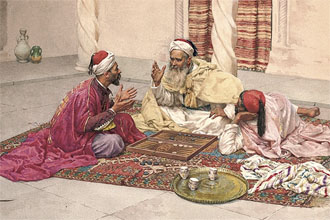|
| Magriel's NYT Columns |
 Last week, the New England Backgammon Club held its annual tournament to benefit the Boston Symphony. Mel Drapkin, one of Boston’s finest players overwhelmed Keven Brandt, 17 to 3, in the finals after beating this writer, 15 to 12, in the semifinals. In the other semifinals, Brandt overcame Don Kandel, while Bill Robertie defeated Jim Halperin to take the consolation prize.
Last week, the New England Backgammon Club held its annual tournament to benefit the Boston Symphony. Mel Drapkin, one of Boston’s finest players overwhelmed Keven Brandt, 17 to 3, in the finals after beating this writer, 15 to 12, in the semifinals. In the other semifinals, Brandt overcame Don Kandel, while Bill Robertie defeated Jim Halperin to take the consolation prize.
In this writer’s match with Drapkin, a situation occurred that illustrates the vast difference in doubling strategy between match and nonmatch play. This writer had fallen behind, 13 to 12, in the 15-point match when the diagrammed position was reached.
|
13
MATCH TO 15 12 |
| Black on roll. |
At first glance, to even consider doubling may appear foolish. Of course, if Black rolls a 2 (11 chances out of 36), he will hit White, and with his strong home board would likely be able to close out White and then win the race. Unfortunately, he is more than twice as likely (25 chances out of 36) to miss White and then lose. What justification can there be for doubling when Black is clearly a decided underdog?
The decision to double is, in fact, correct because of match-score considerations. Bear in mind how many points each player needs to win the 15-point match: White with 13 points needs only 2 additional points to reach 15, whereas Black with only 12 points must score 3 more. Now compare the consequences of doubling in each case.
- Black fails to roll a 2 and misses. If Black has doubled, White will, of course, win the game and the match. However, even if Black has not doubled Black would very likely be gammoned with the cube in the middle at the one level and so lose 2 points anyway. Thus, in the case where Black misses, he has lost little by doubling.
- Black hits with a 2. If Black has doubled, then he will probably win the game to go ahead, 14 to 13, in the match. If Black fails to double, he will certainly double White after hitting and force White to pass, tying the match, 13 to 13. Thus, in the case where Black hits, he gains significantly by doubling.
Doubling in a match when you are not the favorite can be quite advantageous because Black has little to lose and much to gain
In the actual game, after doubling, Black rolled a 5-4, missed White’s blot and lost the match.
* * *
The I.B.A. will conduct the New York State Backgammon Championships this weekend. Final registration will take place tonight at Leow’s Summit Hotel from 6 P.M. to 9.
Rollout
 Tom Keith 2013 |
|
Match to 15 White 13, Black 12 Centered cube Black on roll 1296 games with VR Checker play: 2-ply Cube play: 3-ply Red |
| Cube Action | Game | G | BG | Equity | |||||
| No double |
W L |
.2641 .7359 |
.0000 .5987 |
.0000 .2943 | −1.4765 |

| |||
| Double | Take |
W L |
.2646 .7354 |
.0000 .6025 |
.0000 .1216 | −1.5585 | −1.5585 | (0.0820) | |
| Drop | +1.0000 | ||||||||

|
|

